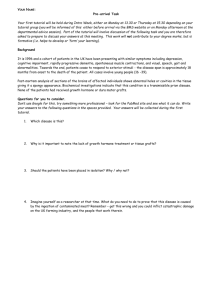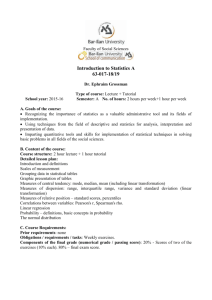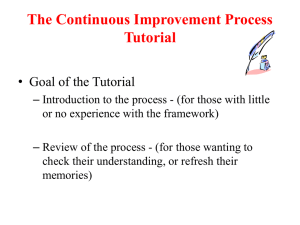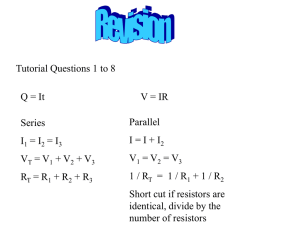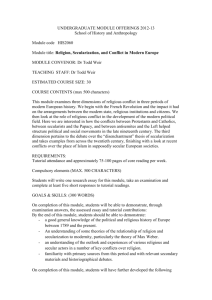University of Toronto MAT 137Y: Calculus! 2015–2016 Course Outline
advertisement
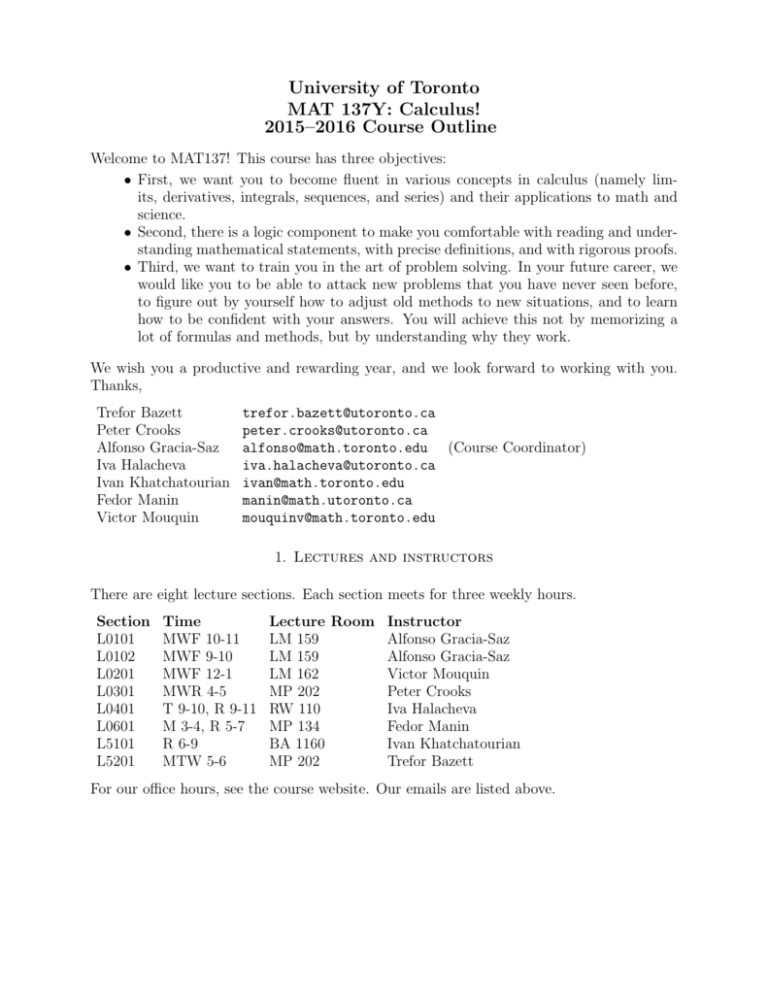
University of Toronto MAT 137Y: Calculus! 2015–2016 Course Outline Welcome to MAT137! This course has three objectives: • First, we want you to become fluent in various concepts in calculus (namely limits, derivatives, integrals, sequences, and series) and their applications to math and science. • Second, there is a logic component to make you comfortable with reading and understanding mathematical statements, with precise definitions, and with rigorous proofs. • Third, we want to train you in the art of problem solving. In your future career, we would like you to be able to attack new problems that you have never seen before, to figure out by yourself how to adjust old methods to new situations, and to learn how to be confident with your answers. You will achieve this not by memorizing a lot of formulas and methods, but by understanding why they work. We wish you a productive and rewarding year, and we look forward to working with you. Thanks, Trefor Bazett Peter Crooks Alfonso Gracia-Saz Iva Halacheva Ivan Khatchatourian Fedor Manin Victor Mouquin trefor.bazett@utoronto.ca peter.crooks@utoronto.ca alfonso@math.toronto.edu (Course Coordinator) iva.halacheva@utoronto.ca ivan@math.toronto.edu manin@math.utoronto.ca mouquinv@math.toronto.edu 1. Lectures and instructors There are eight lecture sections. Each section meets for three weekly hours. Section L0101 L0102 L0201 L0301 L0401 L0601 L5101 L5201 Time MWF 10-11 MWF 9-10 MWF 12-1 MWR 4-5 T 9-10, R 9-11 M 3-4, R 5-7 R 6-9 MTW 5-6 Lecture Room Instructor LM 159 Alfonso Gracia-Saz LM 159 Alfonso Gracia-Saz LM 162 Victor Mouquin MP 202 Peter Crooks RW 110 Iva Halacheva MP 134 Fedor Manin BA 1160 Ivan Khatchatourian MP 202 Trefor Bazett For our office hours, see the course website. Our emails are listed above. 2. Logistics Course sites. • The official course site is http://uoft.me/MAT137 . You are responsible for checking it regularly. We will post on it all official announcements and course materials, including office hours, problem sets, and test information. • We will be using blackboard to post course grades. • There is an online forum for this course on Piazza (link from the course website). This group is a resource for students to meet other MAT137 students, ask questions, discuss problems, make study groups, and in general help each other. Textbook. There are two options for the text for this course: c 2007. • Calculus, One Variable, Tenth Edition, by Salas, Hille, and Etgen: Wiley ISBN: 978-0-470-07333-9 • Calculus, One and Several Variables, Tenth Edition, by Salas, Hille, and Etgen: c 2006. ISBN: 978-0-471-69804-3 Wiley The first book consists literally of the first 12 chapters of the second book, which is all we will use. The second book is longer. Either one is fine. If you have an older edition, you will likely be fine as they are very similar; however, you are responsible for checking for differences. If you wish, you may buy a solution manual at the campus bookstore (as a package with the textbook) which contains full solutions to the exercises in the book. We will also post some supplementary materials on the course site when we study a few topics not in the textbook. Important dates. • 23 Sep 2015 – Last date to add or change tutorials on ROSI/ACORN. After this date, contact instructor Fedor Manin for tutorial enrolment or changes. • 27 Sep 2015 – Last date to add a course. • 9 Oct 2015 – “Change date”: Last date to switch from MAT137 to MAT135. Notice that this is different from dropping MAT137 and adding MAT135 as separate moves (for which the deadline is 27 Sep 2015). If you have trouble with this change, contact your college registrar, not the math department. See http://www.math.toronto.edu/cms/change-dates. • 15 Feb 2016 – Last date to drop the course without academic penalty. Whom to contact? Our emails are listed above. For office hours, see the course website. • For math-related questions about MAT137, you may ask any of the instructors, or visit one of the TAs at the Math Aid Centre. • For tutorial enrolment or tutorial changes after 23 Sep 2015, contact instructor Fedor Manin. • If you have a conflict with a test date, contact instructor Trefor Bazett. • For other logistical questions about MAT137, contact the course coordinator Alfonso Gracia-Saz. • For questions about which math course is right for you, contact the Undergraduate Administrator Donna Birch (dbirch@math.utoronto.ca, BA6291, 416-978-5082). • If you require accommodations for a disability, or have any accessibility concerns about the course, the classroom, or course materials, please contact Accessibility Services: http://www.accessibility.utoronto.ca/index.htm • If you have a personal situation and are concerned about how it will affect your academic performance, please contact your college registrar. 3. What we expect you to know before the course starts The single most common reason for failure in this course is a weak background in precalculus. To help you with this, our department has prepared the following website: http://uoft.me/precalc This site contains a summary of the topics we expect you to have learned in high-school. There are self-diagnostic quizzes you can take, as well as worked examples and practice problems. We will not review this material in class. We expect you to review it by yourself and work on the practice problems by the end of the second week of class. Ignoring this material or letting it go past the second week will make it very difficult to succeed in this course. You may of course ask any questions to instructors during office hours or TAs at to the Math Aid Centre. 4. Tutorials In addition to lectures, you will have one hour of tutorial per week, on Monday or Tuesday. Each week we will select a topic that is particularly important or that we know students struggle with, and you will have the opportunity during tutorial to get very useful practice and to get help from a TA. Notice that you need to enrol both in a lecture section and on a tutorial section separatedly. You need to enrol in a tutorial section by September 23rd. After this date, we handle tutorial changes manually and ROSI/ACORN does not update these changes. If you need to enrol in a tutorial or change a tutorial after this date, see the course website for instructions. The first tutorial will be on September 28th or 29th. 5. Contact info, office hours, and Math Aid Centre There are seven instructors in this course. For math-related questions, you are welcome to talk to any of us; you are not restricted only to your lecturer. For our office numbers and office hours, please check the course website, as they will likely change during the year. Our emails are listed at the beginning of this outline. You do not need an appointment to come during our regularly scheduled office hours. If you cannot make any of our office hours, ask us for an appointment by email or by talking to us at the end of a lecture. We are always happy to talk to students! Please include “MAT137” on the subject of any email you send to us. In addition to our office hours, there will be many MAT137 TAs on duty in the Math Aid Centre (SS 1071) at various times. For the exact schedule, see the course website. Please note that both our office hours and the Math Aid Centre schedule will likely change during the year. Whenever you plan to visit us, please double-check the course website for up-to-date hours. 6. Problem sets The only way to learn mathematics is to practice and receive feedback. To help you with this, there will be 10 problem sets throughout the year. Each problem set will be due in tutorial. You may only turn a problem set in the tutorial section on which you are enrolled. We will mark your problem sets, post the grades on blackboard, and return them to you in tutorial the following week. For each student, we will only count the best 8 out of 10 grades for homework. If you need to miss one homework assignment for any reason, justifiable or not, that will be one of the two grades that we will not count for you. We will not accept late problem sets for any reason. In addition to the problem sets that you will turn in, we will also post practice problems from each section of the textbook. We encourage you to work through them as we cover the sections in class. You have answers to them at the back of the book, full solutions in the solution manual, and you can always visit us during office hours or go to the Math Aid Centre for help. On computations. We will not be including routine computational questions on your problem sets, since you do not need our feedback to become good at these. We will include them in the practice problems and in some tutorials. You are responsible for getting enough practice so that you can solve such questions on tests quickly and without error. A note on collaboration. Discussing exercises (including graded homework problems) with your classmates is a useful and mathematically healthy practice. However, when it comes time to write up your solutions for submission, you must work independently and present solutions in your own words. To be certain, work together with your classmates in the discovery phase, but do not work together when you are writing your solutions, and never have the solution written by a friend in front of you when you are writing yours. Doing otherwise amounts to academic misconduct, and the penalties are severe. For more information, please read the University policy on academic misconduct at http://www.artsci.utoronto.ca/newstudents/transition/academic/plagiarism. 7. Term tests and the final exam There will be four term term tests on: • Test #1: Friday, 23 October 2015, 4-6pm. • Test #2: Friday, 27 November 2015, 4-6pm. • Test #3: Friday, 5 February 2016, 4-6pm. • Test #4: Friday, 1 April 2016, 4-6pm. We will post detailed information on each test on the course site. If you have an academic conflict for one of the tests (for example, a tutorial or a lab for a different course), then we will allow you to write an early sitting of the test. In order to take advantage of the early sitting, you will need to let us know at least one week before the date of the test. We will post more information on the course site. If you are unable to write any of the term tests for a legitimate reason (e.g. severe illness), we will accommodate you, but you must notify us as soon as it is possible (no more than twenty four hours after the test), and you will have to provide us with appropriate documentation. We will post more information on the course site. For any questions about conflicts with test times or dates, or if you miss a test, please contact instructor Trefor Bazett. There will be a three hour cumulative final exam during the April 2016 exam period. The exact date and time will be posted by the Faculty of Arts and Science. We do not permit the use of any type of calculator during term tests or the final exam. 8. Week-by-week course schedule For our week-by-week course schedule, including list of topics, tutorial dates, problem sets due dates, and more, see the course website. 9. Marking scheme We will calculate your course mark as follows: • First, we calculate your problem set mark by averaging your best 8 out of the 10 problem set marks. • Then, we calculate your term mark by averaging your four test marks and your problem set marks. For this: – your best test counts for 25% – your worst test counts for 15% – each of your other two tests counts for 20% – your problem set mark counts for 20% • Finally, your course mark will be 40% · (Term Mark) + 60% · (Final Exam Mark) or 60% · (Term Mark) + 40% · (Final Exam Mark), whichever is higher.

